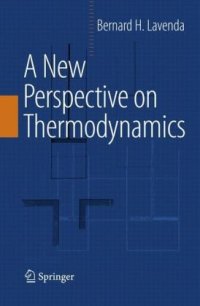
Ebook: A New Perspective on Thermodynamics
Author: Bernard H. Lavenda (auth.)
- Genre: Physics // Thermodynamics and Statistical Mechanics
- Tags: Probability Theory and Stochastic Processes, Theoretical and Applied Mechanics, Thermodynamics, Statistical Physics Dynamical Systems and Complexity, History and Philosophical Foundations of Physics
- Year: 2010
- Publisher: Springer-Verlag New York
- Edition: 1
- Language: English
- pdf
Dr. Bernard H. Lavenda has written A New Perspective on Thermodynamics to combine an old look at thermodynamics with a new foundation. The book presents a historical perspective, which unravels the current presentation of thermodynamics found in standard texts, and which emphasizes the fundamental role that Carnot played in the development of thermodynamics.
A New Perspective on Thermodynamics will:
- Chronologically unravel the development of the principles of thermodynamics and how they were conceived by their discoverers
- Bring the theory of thermodynamics up to the present time and indicate areas of further development with the union of information theory and the theory of means and their inequalities. New areas include nonextensive thermodynamics, the thermodynamics of coding theory, multifractals, and strange attractors.
- Reintroduce important, yet nearly forgotten, teachings of N.L. Sardi Carnot
- Highlight conceptual flaws in timely topics such as endoreversible engines, finite-time thermodynamics, geometrization of thermodynamics, and nonequilibrium work from equilibrium free energy differences.
Dr. Bernard H. Lavenda is Professor of Physical Chemistry at Universita degli Studi di Camerino, Italy. He is recipient of the 2009 Telesio-Galeli Prize in Physics for his work on irreversible thermodynamics.
The book adheres to a chronological development of the laws of thermodynamics as the inventors of those laws discovered them. This shows that "new" discoveries of non-optimal efficiencies are not new at all and have been analyzed by people like Lord Kelvin as far back as 1852 in his analysis of an unevenly heated body.